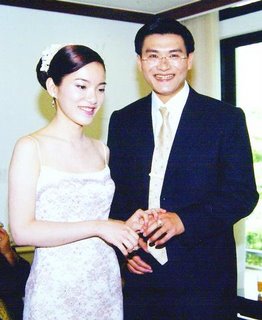Finally, it was starting to look like Beijing had a powerful propaganda item on its hands when, a little while ago, Taiwan President Chen Shui-bian's (陳水扁) son-in-law, Chao Chien-ming (趙建銘), was detained on suspicion of insider stock trading. Since that incident, the Taiwanese opposition has vigorously campaigned for Chen to step down. Across the Strait, the government in Beijing was salivating and spared no effort to illustrate how corrupt Taiwan had become. The People's Daily News and the Xinhua news agency, both apparatuses of the Chinese government, couldn't have been happier to publish articles on the matter.
And then the propaganda cocktail blew up in Beijing's face, as ordinary Chinese began commenting on how wonderful Taiwan's "true democracy" was, so wonderful, in fact, that even the President's son-in-law wasn't beyond the reach of the law—a development that is altogether unthinkable in today's China. Internet chat rooms soon filled with references to Taiwan's "enviable" state and China's "true decay," the very antipode of what Beijing had hoped its citizens would swallow. Chinese-style Orwellian furnaces and Google-assisted Internet police notwithstanding, that little fire is out and free.
Adding to the delicacy of the whole incident is the fact that Beijing University had intended to invite Chinese Nationalist Party (KMT) Legislator Chiu Yi (邱毅), who made the initial allegations about Chao, for a lecture, with the hope that he could kindle the flame of anti-corruption on the Mainland. As a result of the unexpected response to the news articles, however, Beijing has retracted its invitation, for fear that Chiu's visit would have an "undesirable" impact on Chinese society.
 As experienced from the Taiwanese side, the entire recall motion against President Chen stinks of an opposition that has long waited for the opportunity to pounce, fangs drawn, upon its weakened prey. In many ways, it reminds me of Bill Clinton during the impeachment circus, with the Republicans gleefully feeding like vampires at a blood banquet. Nevertheless, it is admirable that the Taiwanese system would allow for high-ranking individuals or people who are connected to such people (Chao is married to Chen's only daughter), to face the full weight of the law with such expediency. If it ever chose to pay attention to the heart of the matter instead of trying to extract the propaganda juices from it, China certainly could learn a lesson or two from the Chao incident. And so could Canada, come to think of it.
As experienced from the Taiwanese side, the entire recall motion against President Chen stinks of an opposition that has long waited for the opportunity to pounce, fangs drawn, upon its weakened prey. In many ways, it reminds me of Bill Clinton during the impeachment circus, with the Republicans gleefully feeding like vampires at a blood banquet. Nevertheless, it is admirable that the Taiwanese system would allow for high-ranking individuals or people who are connected to such people (Chao is married to Chen's only daughter), to face the full weight of the law with such expediency. If it ever chose to pay attention to the heart of the matter instead of trying to extract the propaganda juices from it, China certainly could learn a lesson or two from the Chao incident. And so could Canada, come to think of it.

1 comment:
Nice! Where you get this guestbook? I want the same script.. Awesome content. thankyou.
»
Post a Comment